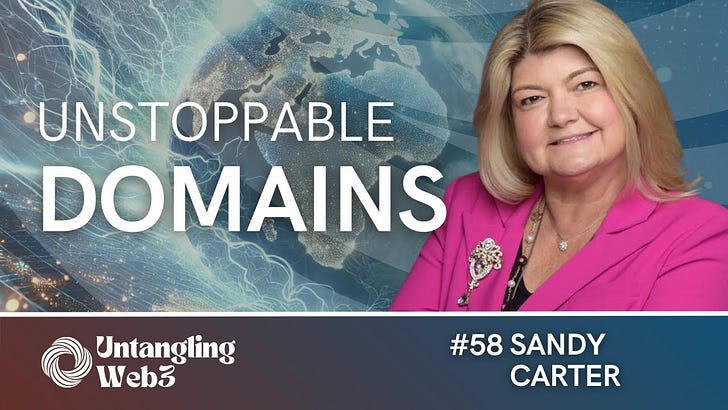#58 Untangling: Unstoppable Domains with Sandy Carter
How can crypto secure your identity on the Internet?
In this edition of the Untangling Web3 newsletter, we're getting to grips with the concept of Unstoppable Domains, crypto-backed domain names, with the help of Sandy Carter.
In the age of decentralization, Web3 domains are emerging as a transformative tool for redefining digital identity, ownership, and privacy.
Unlike traditional domains, which merely direct users to websites, Web3 domains integrate blockchain technology to unlock new possibilities for individuals and businesses alike.
As digital ecosystems evolve, Web3 domains offer a unique way to simplify interactions, enhance privacy, and promote true ownership in an increasingly connected world. With applications spanning finance, healthcare, and online communities, they represent a fundamental shift toward a more user-centric internet.
Haven’t listened to the episode yet? These are our highlights and key takeaways:
Domains as Digital Addresses - Simplifying the Complex: Traditionally, domains have acted as the “addresses” of the internet, helping users navigate without relying on complex numerical IP addresses. Web3 domains take this further, functioning not only as website locators but also as personal identifiers. A Web3 domain can resolve a wallet address for crypto payments, eliminating the need to remember long strings of alphanumeric characters. For example, instead of managing a complicated wallet address, users can send or receive payments with a simple “name.crypto” address, making blockchain technology more accessible to everyone.
A New Era of Digital Ownership: Unlike traditional Web2 domains, which are rented on a yearly basis, Web3 domains are owned permanently by the user. This ownership ethos reflects the core principles of Web3—decentralization and user control. Owning a Web3 domain ensures users retain access and control over their digital identity, free from the risk of losing it due to expiration or external platform changes, as often happens with Web2 services.
Digital Identity: Beyond Businesses to Individuals: In Web3, domains expand their focus from representing businesses (e.g., amazon.com) to empowering individuals. A Web3 domain serves as a personal digital identity that integrates with various blockchain applications. Imagine an online profile that consolidates your credentials, payment information, and memberships, all under one domain that you own. This enables seamless integration across ecosystems while ensuring you decide what information is shared and with whom.
Privacy and Data Control - Empowering Users: Web3 domains offer granular control over data sharing, a feature absent in traditional digital systems. For instance, users can choose to share only specific information, such as their age verification for accessing a service, while keeping other personal details private. This contrasts with traditional systems, where sharing sensitive documents like a driver’s license reveals far more information than necessary. By leveraging blockchain’s transparency and privacy features, Web3 domains empower users to protect their personal data without compromising utility.
Healthcare and Digital Identity: Life-Saving Potential: The applications of Web3 domains in healthcare are profound. Consider an individual storing their medical records securely on their Web3 domain. In emergencies, these records can be accessed instantly, enabling timely and informed medical decisions. This addresses the inefficiencies of siloed healthcare systems, where transferring records across providers can delay treatment. A Web3 domain ensures individuals retain ownership of their health data while granting access when needed.
Tokenization - Adding Superpowers to Traditional Domains: Web3 introduces the concept of tokenization, where traditional domains can be enhanced with blockchain capabilities. For example, a "name.com” domain can now store digital assets, resolve wallet addresses, and act as a decentralized identifier. This fusion of Web2 and Web3 features creates versatile tools that cater to both blockchain-native and traditional internet users, making Web3 adoption more intuitive and universal.
Interoperability Across Ecosystems: Web3 domains are inherently multi-chain, allowing users to operate seamlessly across different blockchain networks. Whether it’s using a domain to access decentralized finance (DeFi) applications, gaming platforms, or healthcare records, users benefit from cross-platform compatibility. This interoperability reduces friction and expands the utility of Web3 domains, making them powerful tools for a connected digital future.
Digital Communities and Reputation Systems: Web3 domains are not just about individual identities; they also enable the formation of digital communities. A domain can serve as an access key to exclusive groups, enabling encrypted communication and shared governance. For instance, a gaming community can use a domain-based system to verify membership, while blockchain technology ensures the authenticity of reputations and interactions within the group.
Uncover the details behind all these insights and more on Spotify:
Conclusion
Web3 domains are setting the stage for a decentralized, user-first internet by revolutionizing how we manage digital identity, ownership, and data.
Their ability to simplify complex processes, enhance privacy, and promote interoperability offers immense potential across industries like finance, healthcare, and online communities.
As decentralization continues to shape the digital future, Web3 domains are poised to become indispensable tools for individuals and businesses alike, empowering them to navigate a more secure, private, and connected digital landscape.
📬 There's more!
Love what you're hearing?
Got a question or topic suggestion? You can get in touch and let us know your thoughts at theuntanglingweb3podcast@gmail.com.
Untangling Web3 is brought to you by hosts Jack Davies and Alec Burns, with music by Daniel Paigge. The views we express here are our own, and do not represent the views of our employers.
Nothing discussed or stated in the show should be considered financial advice.





